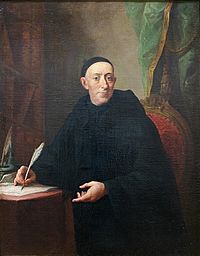Benito Jerónimo Feijóo y Montenegro facts for kids
Quick facts for kids
Benito Jerónimo Feijóo
|
|
|---|---|

Portrait of Feijóo y Montenegro
by Mariano Salvador Maella |
|
| Born | October 8, 1676 |
| Died | September 26, 1764 (aged 89) |
| Nationality | Spanish |
| Occupation | Monk, scholar, essayist |
Friar Benito Jerónimo Feijóo y Montenegro (8 October 1676 – 26 September 1764) was a Spanish monk and a very smart scholar. He was a key leader during the Age of Enlightenment in Spain. He worked hard to share new ideas and encourage people to think scientifically. He wanted to clear up myths and superstitions that were common at the time.
His Life Story
Benito Jerónimo Feijóo joined the Benedictine order when he was just 14 years old. He studied in different places like Galicia, León, and Salamanca. Later, he became a teacher at the University of Oviedo. He taught theology (the study of religion) and philosophy (the study of knowledge and how we think). He eventually became a professor there.
Feijóo was very concerned about the superstitions and lack of knowledge common in his time. His writings aimed to fix these problems. His fame quickly grew across Europe. Some people in Spain didn't like his new ideas, but their opposition didn't stop him. Feijóo was recognized for helping education and knowledge long before he passed away in Oviedo.
He might not have been a famous inventor or a writer with a super unique style. However, his writing was clear and easy to understand. He tried to get rid of many popular mistakes and made people interested in scientific methods. He is remembered as the person who started important changes in education in Spain.
His Important Books
Feijóo wrote two very famous collections of essays: Teatro crítico universal (published from 1726 to 1739) and Cartas eruditas y curiosas (published from 1742 to 1760). These books had many volumes filled with essays on all sorts of topics.
He wrote about natural history, science, education, history, religion, literature, and even medicine. He also wrote about superstitions, amazing events, and interesting news of his time. These works helped to spread new ways of thinking and encouraged people to question old beliefs. His writings were even translated into English.
See also
 In Spanish: Benito Jerónimo Feijoo para niños
In Spanish: Benito Jerónimo Feijoo para niños
 | Stephanie Wilson |
 | Charles Bolden |
 | Ronald McNair |
 | Frederick D. Gregory |

